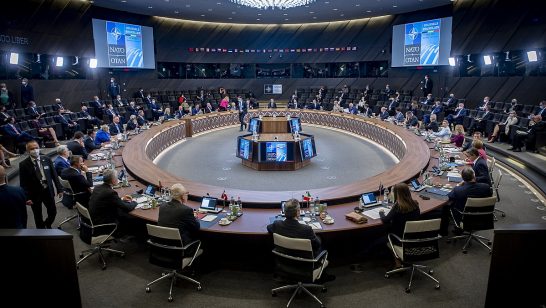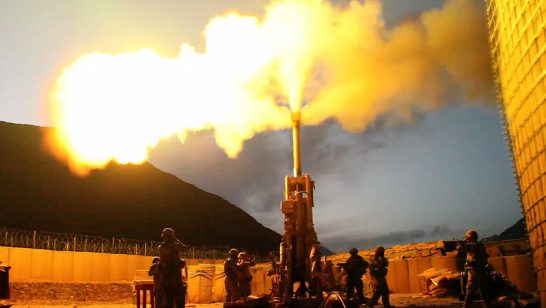
During a visit to Turkey last week, NATO Secretary-General Jens Stoltenberg urged President Erdoğan to green-light Sweden and Finland’s accession to the Alliance. Some critics have argued that Turkey’s failure to ratify the Accession Protocols of the two Nordic countries is due to Turkey’s support of Russia. In reality, Turkey’s position is a result of its own legitimate security concerns. It expects the trilateral memorandum agreed upon in June by Finland, Sweden, and Turkey to yield concrete action from the two Nordic countries in its fight against terrorism which it considers an existential threat, while NATO’s new Strategic Concept defines it as one of the main threats that citizens of the Allied nations face.
This is part of a larger story. Since Russia’s war in Ukraine began in February this year, in some western circles, there has been a question mark over Turkey’s position vis-à-vis the ongoing conflict. At various international debates, I have at times observed that this has led to unjustified and misleading assertions regarding Turkey’s standing on the conflict.
Turkish policy since 2014
Turkey, first and foremost, is a member of NATO. All decisions since 2014 to strengthen the Alliance’s deterrence and defence in the face of Russia’s pattern of aggressive behaviour were taken with the strong support of Turkey, including those adopted at the Madrid Summit in June this year.
Analysing some salient features of Turkish policy since 2014 may shed some light on discussions around Turkey’s position. Turkey has stated its unwavering support for the sovereignty and territorial integrity of Ukraine with its non-recognition policy of the illegitimate and illegal annexation of Crimea. It has also taken part in the International Crimea Platform since its inception and has lent strong support to this initiative. Turkey has also highlighted the severe human rights violations perpetrated by Russia against the population living in the peninsula, including the indigenous minority: the Crimean Tatars.
The long history of Turkish-Russian relations
While Turkey and Russia fought a number of wars against each other in their imperial past, the Soviet Union was among one of the first countries to recognise the Government of the Turkish Grand National Assembly in 1921. In the following two decades, the two countries were able to engage with each other on the foundations of the Treaty of Friendship and Non-Aggression, signed in 1925.
In 1945 Soviet Russia wanted to renegotiate this Treaty together with the Montreux Convention that recognised Turkish sovereignty on the Turkish Straits, including the right to regulate the maritime traffic through those Straits. The Straits constituted the main reason for contention in Soviet Russia’s relations with Turkey and this issue, together with Russia’s territorial claims over some provinces in the Eastern part of Turkey, forced Turkey to accelerate its efforts to be part of the family of nations of the West. These efforts culminated in Turkey’s accession to the Council of Europe as a founding member in 1949 and becoming a member of NATO in 1952. Although there were not many options to ensure security in the face of Stalin’s ultimatums and territorial demands, one cannot ignore the importance of Turkey’s deliberate choice to be part of Western democracies rather than the autocratic regimes of the time.
After the Second World War, Turkey’s relationship with Russia was primarily influenced by the Cold War rivalry between the West and the Soviet Union. Despite Turkey’s strategic decision to participate in Western institutions, Turkish-Russian relations were conducted in a spirit of mutual respect and cooperation. Even when centre-right governments were in reign in Turkey in the 1960s, Russia was an important partner who actively invested in Turkey’s infrastructure by building, among other things, steel and aluminium factories and an oil refinery.
Today, although Turkish-Russian relations appear complicated at first glance, there is a discernible pattern that goes back decades. Tacan Ildem
Today, although Turkish-Russian relations appear complicated at first glance, there is a discernible pattern that goes back decades. Bilateral relations have been driven by careful compartmentalisation of strategic interests and divergences. A purposeful culture of engagement has developed throughout the years, where both countries are able to “agree to disagree” on a number of crucial topics. This is evident across a broad range of recent issues, from Libya, Syria, and Nagorno Karabakh, to the Russian occupation and invasion of Ukraine, where they are on opposing sides.
In the recent past, Turkey often found Russia to be the only or the most significant actor in conflicts around her. In a sense, Russia became a neighbour not only in the North over the Black Sea but in the South as well. We see selective and limited cooperation where their interests are aligned, alongside competitive cooperation where strategic interests remain at odds in the broader picture. The competitive cooperation pattern, at times, has been breached by “politico-military systemic anomalies”, such as the downing of a Russian fighter bomber by the Turkish combat air patrols in 2015 or the killing of over 30 Turkish troops in Idlib by Russian and Syrian joint operations in 2020. Although such incidents have the potential to strain relations, Turkey and Russia have so far managed to demonstrate impressive comebacks. Their ability to restore ties following serious setbacks, in addition to the compartmentalisation feature, is a key strength of this bilateral engagement.
Turkey’s balancing act on Ukraine today
Three days after the launch of the so-called Russian “special operations” in Ukraine, it was remarkable that Turkey was able to declare this evolved situation a “war”. It swiftly invoked the relevant articles of the Montreux Convention, notably article 19, prohibiting the passage of warships of the belligerent parties through the Straits.
High-level engagement at the leadership level has continued between Turkey and Russia in recent years, partly because of the need to talk to each other about a number of conflicts they are involved in across different geographies. But Turkey has also strengthened its strategic partnership with Ukraine in the last 12 years. This partnership has encompassed different areas of cooperation, including mutually rewarding cooperation in defence. Turkey has been providing Bayraktar TB-2 drones since the start of the invasion. This has been instrumental in bringing a qualitative change to the Ukrainian war effort on the ground, so much so that many newborn babies in Ukraine have been named “Bayraktar”.
Other significant developments are the cooperation between Turkey and Ukraine to produce “Kızılelma” (Red Apple) stealth drones in Ukraine, and the provision of armoured mine-resistant vehicles (“Kirpi”), from Turkey, which can be fitted with M2HB machine guns, MK19 automatic grenade launchers, and remote-controlled weapon systems. Finally, Turkey is actively engaged in the modernisation efforts of the Ukrainian naval forces, and recently the keel of Ukraine’s first Ada-class corvette was laid at a Turkish shipyard.
Although Turkey has adopted a supportive stand towards Ukraine – and is a vocal supporter of NATO’s open-door policy for enlargement (and the eventual accession of both Georgia and Ukraine) – it is also trying to act in a balanced manner for geopolitical reasons.
First, Turkey has not joined the sanctions imposed on Russia by the US and the EU (Turkey has been a longstanding principled approach of implementing only UN-imposed sanctions, not those adopted by a country or a group of countries). Regarding the EU sanctions, Turkey generally feels that the EU has all but forgotten about Turkey’s EU candidate status, and that the EU cannot reasonably expect Turkey to follow EU sanctions policies in the meantime. The EU seems to have a purely transactional approach to relations with Turkey, prioritising limited cooperation in areas of importance for the EU, like migration. Second, while having imposed restrictions on Russian military flights over its airspace, it has kept civilian air traffic open to Russia.
Since March of this year, this balanced approach has enabled President Erdoğan to reach out to both Putin and Zelensky in diplomatic efforts to facilitate agreements on different fronts. These have had some tangible results, such as the grain deal and the agreement on the exchange of prisoners of war, demonstrating the importance of keeping channels of communication with both parties open to bring about concrete results on humanitarian grounds. It also underlines the need to talk to Moscow, as confessed by President Macron recently.
This balanced approach has enabled President Erdoğan to reach out to both Putin and Zelensky in diplomatic efforts to facilitate agreements on different fronts, demonstrating the importance of keeping channels of communication open. Tacan Ildem
So far, Turkey has been able to continue this approach but this may prove difficult as the war goes on, especially if there is further Russian escalation. The potential difficulties in this balancing act have been exemplified by the recent decisions of private and public banks to withdraw from the Russian MIR credit payment system.
Public perception of the war
It would be useful to make a few observations about how the Turkish public perceives the war. At the start of the war, the mainstream media was dominated by those who belong to the “Eurasian” school of thought, advocating for good relations with Russia while being sceptical about the necessity to act together with the US and other NATO Allies. Due to the strained relations with the US in recent years, the public support that NATO enjoyed in Turkey has suffered as there is a tendency to perceive NATO from the prism of bilateral relations with the US. As a result, the general thrust of viewpoints were relatively more pro-Russian.
Independent from any political party affiliation, the general sentiment in Turkey is somewhat bitter because of the support that the US renders to PYD/YPG in Syria who are affiliated with PKK, which is listed as a terrorist organisation both by the US and the EU. In public debates, Ukraine was portrayed as a state used or manipulated by Western powers in their ambition to encircle Russia. According to this view, the war was a result of the provocations of the West, which did not give any other choice to Putin but to start “military operations” in Ukraine. They expected that Putin would be victorious in a matter of weeks, if not days, which would be a blow to the credibility and standing of the West, particularly of the US. However, Russia’s poor military performance has become a source of disappointment for these circles.
Although there are still some pro-Russian and anti-Western statements in public discourse, the mood has changed considerably. Tacan Ildem
Although there are still some pro-Russian and anti-Western statements in public discourse, the mood has changed considerably. This is partly because of the harsh criticism levelled against Putin by political figures across the board in Turkey after Russia showed its aggressive face in an undeniable fashion. In a recent interview, President Erdoğan said that any peace deal should include provisions for the return of all territories occupied by Russia, including Crimea, back to Ukraine. One of the opposition leaders, Ms Meral Akşener, Chairperson of the centre-right conservative GOOD Party (part of the six-party opposition front), was the first in Turkey, after the sham referendum in four regions of Ukraine, to make a strong statement harshly criticising Putin. She stated that this so-called referendum was a clear violation of the right to sovereignty which is the basis of international law, and that Putin’s adventurist behaviour is not only a threat to Ukraine but to the security and territorial integrity of all countries in the region. The government also criticised Russia for the referendum and declared that the annexation of these regions, like Crimea, would never be recognised by Turkey.
Statements coming both from the government and opposition figures like Ms Akşener seem to be resonating well, especially with the nationalist and conservative constituencies who started to voice their criticism against Russia in this ongoing war. It is not a coincidence that the recent poll conducted by Kadir Has University shows an increase in public support for NATO (60%) compared with the past two years.
Appropriate judgement on complex foreign and security policy issues requires a comprehensive analysis based on objective facts and a recognition of the sensitive dynamics generated by the geopolitics of the region. It is hoped that this analysis can go some way in helping others avoid jumping to conclusions with clichés when considering Turkey’s position on the ongoing Russian war in Ukraine.
The opinions articulated above represent the views of the author and do not necessarily reflect the position of the European Leadership Network or all of its members. The ELN’s aim is to encourage debates that will help develop Europe’s capacity to address the pressing foreign, defence, and security policy challenges of our time.
Image: Wikimedia commons, Russian Presidential Executive Office



